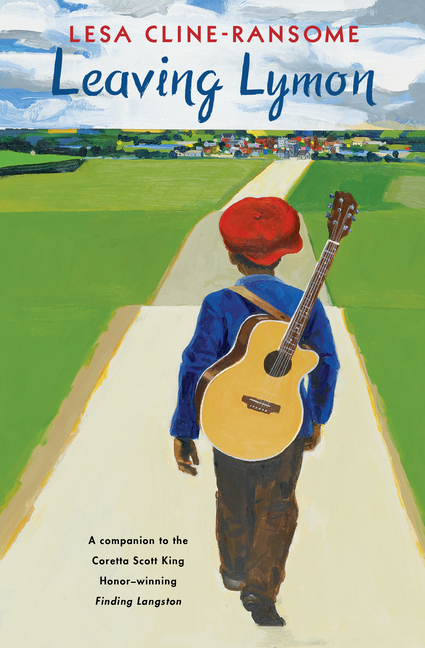Meet-the-Author Recording with Lesa Cline-Ransome
Leaving Lymon |
Lesa Cline-Ransome introduces and shares some of the backstory for creating Leaving Lymon.
Translate this transcript in the header View this transcript Dark mode on/off
Lesa Cline-Ransome: Hi, my name is Lesa Cline-Ransome and I am the author of Leaving Lymon. When I first began writing my novel, Finding Langston, about a young boy who leaves rural Alabama with his father after the death of his mother, I never imagined that the characters in that book would find lives and books of their own, but in Chicago, as Langston is struggling at home with his grief and his loneliness, he faces other battles at school, namely a small group of boys, Clem, Errol, and their ringleader, Lymon, torment Langston at school. After Finding Langston was released, I began receiving letters from readers asking about other characters in the book, but most wanted to know what happened to the bully named Lymon.
All I knew about Lymon when he was a character in the Finding Langston book was that he was a boy who was skinny and mean. He had one eye that was smaller than the other and he had difficulty reading. So I started with those details and I worked my way backwards to the beginning of Lymon's life, focusing on why he had difficulty reading.
In writing the story of Leaving Lymon, I became very, very emotionally connected to Lymon. I mean, here was a boy who's kind of fallen through the cracks, especially in the educational system in Mississippi where he was born and also in Milwaukee where he and his grandmother move in with family, and finally in Chicago where he goes to live with his mother and a very cruel and abusive stepfather, Robert. So we begin to see that he transforms very slowly into this bully. But what I love about Lymon's story is that he has something that we know is going to allow him to rise above his circumstances. He has this love of music and so he carries this love and his passion for music in his life, much like Langston carried his love of poetry. And so the two boys actually had a lot in common, which we don't have the opportunity to see in the book Finding Langston. And now I'm going to read a chapter from Leaving Lymon.
Chapter Two, Vicksburg, Mississippi, 1939.
I knew it was Friday when Grandpops started cleaning his guitar. He worked the week at the mill coming home every night, tired and dirty. Ma had supper ready, and as soon as Grandpops washed up, we'd eat. After the supper dishes were cleaned, Ma sat out front with me and Grandpops, watching the lightning bugs, and doing her crocheting, Grandpops talking a mile a minute and plucking his favorite songs on his guitar, Ma saying every now and then, "mmm-hmmm," and tapping her foot. But on Friday nights, Grandpops didn't eat supper with us. He'd come home, same as always, but he'd wash up, then polish up his guitar, check the strings, and one by one, his men friends would come by the house with guitars and harmonicas, one banjo.
Ma would stay in the kitchen making sandwiches and put them on a big ole plate and bring out some soda pop to the front room. Later it got, after the sandwiches and pop were gone, the men would take out jars of other drinks they'd pass around.
When it was still early, Grandpops would let me sit with them in the front room and listen. Sometimes they did more talking than playing. But on a good Friday, when everyone was in the mood for playing, it could go on nearly all night.
The man with the banjo was Mr. Joe from church. He came every week with the same old beat-up overalls and worn-through shirt. He looked old enough to be my grandpops' daddy, but if you closed your eyes when he sang, his voice sounded young and sweet as a girl's. He hiked one leg up on the chair while he played his banjo. Tilted his head back and sang. On those nights I'd see Ma standing in the doorway of the kitchen, her hand tapping her thigh in time to the music.
My grandpops would strum along behind Mister Joe's singing and you could hear the other man saying low, "c'mon now, Joe," and "tell it," just like we were in church on Sunday morning. If it got too good, I couldn't stop myself from clapping. One time Grandpops pulled me onto his lap. "You remember that song we've been working on?" he asked.
I nodded. "Go on ahead then," he said. Grandpop sat his guitar on my legs, and I started right in playing.
I looked around and all the men were nodding their heads, smiling and making me feel like church again. When I played the wrong note, they said, "That's alright, son." I felt like one of them then, as big as my grandpops and his men friends. When I finished, they all clapped and shook my hand. "Nice work, little man." "We're gonna to need to pull up another chair soon," my grandpops told me. "But for now, you need to get on to bed."
My ma took me in, and got me washed up. When I settled in, I laid awake listening to them play, thinking wasn't nothing better than my grandpops, Friday nights, and music.
This Meet-the-Author Recording with Lesa Cline-Ransome was exclusively created in April 2020 by TeachingBooks with thanks to Holiday House.



